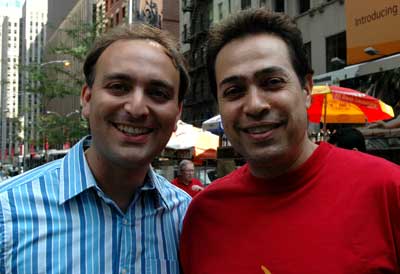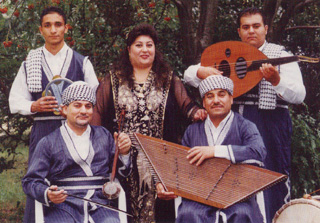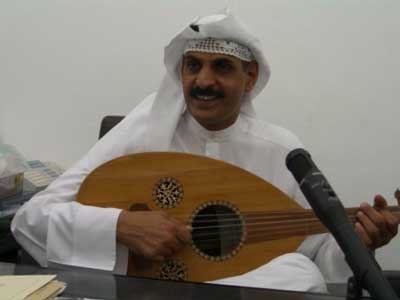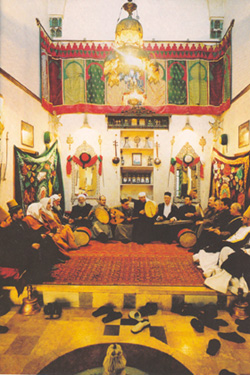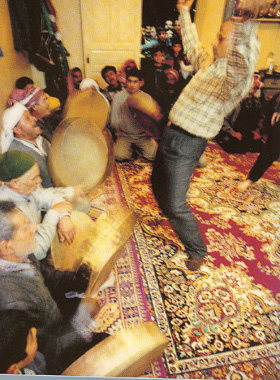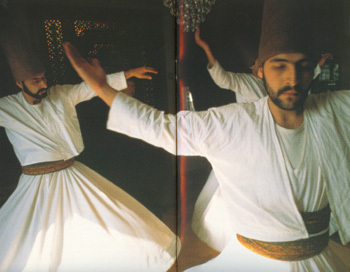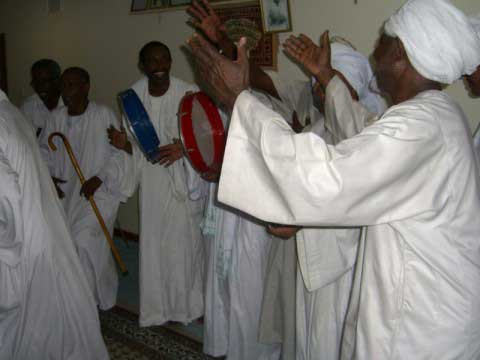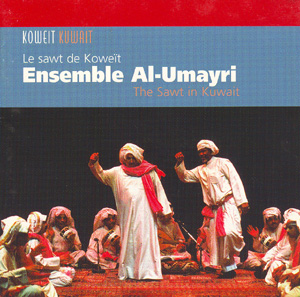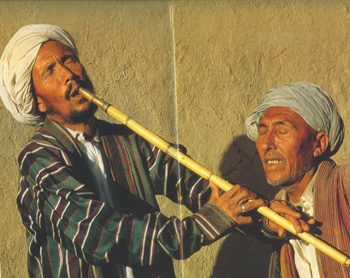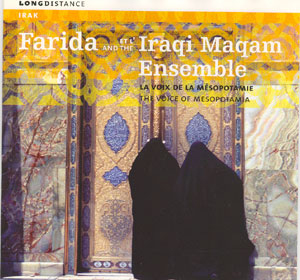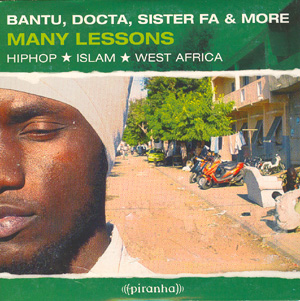Author and Middle East specialist Joseph Braude provides the principal voice on Afropop Worldwide’s Hip Deep program, “Music and Islam: From Prohibition to the Science of Ecstasy.” In preparing for this program, Joseph spoke with two authorities on Islam, Professor Emeritus at Rutgers University Fadlou Shihadi, author of “Philosophies of Music in Medieval Islam,” and Sheikh Tamer Salim, a Muslim cleric, originally from Egypt, but now working in Brooklyn, New York. What follows is Banning’s conversation with Joseph, including excerpts from the discussions with the two Muslim scholars.
Banning Eyre: To start, Joseph, why don’t you introduce yourself?
Joseph Braude: I am a writer and a specialist in the Middle East, where I spend a lot of time, and where half of my family hails from. I'm excited about exploring this topic of music and Islam as someone who is a musician himself and has spent a lot of time studying Arabic and Islamic history in school and with people in the region.
B.E.: Now, since we will be referencing some quotes from your interview with Dr. Fadlou Shihadi, why don’t you introduce him as well?
J.B.: Dr. Fadlou Shihadi is a professor emeritus at Rutgers University and the author of the seminal book about this subject called Philosophies of Music in Medieval Islam. He is also a baritone singer and a lover of every kind of music himself. In his scholarship about music and classical Islam, Dr. Shihadi parses the debates that were going on in the classical period between all the different major thinkers of Islamic law and philosophy, how they differed from one another, and how they agreed with each other about many key points on legislating music. When we met, he started out with this general statement:
Fadlou Shihadi: Islam is a comprehensive religion. In other words, it’s concerned not just with the relation between man and God but with every aspect of human life. So there is a concern that the life of the individual in that society shall follow the straightforward path, which is submission to the will of God, or in the Mystic tradition, to become one with god. So this centrality of the God relationship could be threatened in a number of ways. And it was perceived that music—and I think it’s wrong for those who talk about music in general—certain kinds of music, associated with debauchery or cabaret music in the bad sense of the word, that these things, since they arouse strong passions, would be, as some would put it, the devil’s way of turning people from God. And that’s a grave concern for religious people. I think the more moderate people would say it depends on what the situation of the music, what kind of music, and so on. For instance, chanting of the Koran, if that is considered music, the chanting of camel caravans, music in special celebrations, which was implicitly accepted for the Prophet—these are accepted. An analogy is often made with speech. I mean, if you can use speech for cursing, that’s not a reason to abolish speech. And therefore why say you shouldn’t listen to music regardless of what the circumstances are?
B.E.: Let’s go back to the early days of Islam. Tell us about the world Islam inherited at its birth in the early 7th century.
J.B.: Islam is a venture that started in the Arabian Peninsula and spread over a century’s time to become one of the largest landed empires in the history of the world. People say about Islam that it happened in the light of history, because the lands that Islam inherited are rich with history and culture and religion and a tapestry of civilization, all of which infused Islam with new energies. Specifically, Islam inherited the lands and traditions of two world empires, the Byzantine Empire in the West, and the Persian Sassanian Empire to the east. These lands were filled with a variety of traditions and cultures, Judaism from east to west, Christianity in various iterations, Zoroastrianism, and a long list of pagan or polytheistic faiths, all of which had to be negotiated culturally and politically with their new Muslim rulers.
Over a space of 150 years, Islam grew from this small, ambitious venture in the Arabian Peninsula to a vast landed empire, a caliphate as it was called, with its capital in Baghdad. And in that new Muslim city—it was a city founded by the Muslim conquerors—a very sophisticated, cosmopolitan court around the Caliph sought to sponsor and spread the best of world civilization, and to mediate the legacies of that civilization in an Islamic context.
Islam had inherited the literature of the ancients, all the Greek legacies of philosophy, music, history, medicine. So you have the caliphate sponsoring a movement to translate all the ancient Greek texts that were available and deemed to be useful, from ancient Greek into Arabic. To this day, with all of our translation software, it is considered to be the most ambitious and expansive translation project in the history of the world. But Muslim scholars in Baghdad in the 8th, 9th, and 10th centuries did more than translate these texts. They studied and interpreted them. They carried on the debates of antiquity from ancient Greece, and they embellished and further developed them in an effort to codify all that was known in different disciplines going back thousands of years.
B.E.: What ideas about music did Islam begin with?
J.B.: There were several important schools of ancient Greek thought about music that the early Muslims inherited. The Pythagoreans believe that in order to understand music, you have to see it in the universal, celestial context of all other fields of science and philosophy, nature, and medicine. These ideas are popularized in the sort of New Age thinking that talks about the music of the spheres, the celestial music of the universe, and the way music broadly connects to each and every one of us. Intuitively, we've heard these ideas before, and ultimately they stem from the Pythagorean school of musical thought. Here’s how Dr. Shihadi described this school of thought:
Fadlou Shihadi: If you think the universe is interconnected in such a way that that every part is to be understood in its relation to other parts, then music is part of the universe, and therefore it must be understood in terms of its relation to some of the other things: the stars, the seasons, even the phases of moon. And therefore if you seek knowledge about the science of music, you have to learn of these interconnections. It’s amazing. You take the lute, the oud, which is the piano of Arabic music composition—it’s the central instrument, and certainly the instrument for theory. So there are four strings on the lute, ranging from the thin to the thick. These are correlated with everything except ice cream. I mean they are correlated with the humors of the body, with the phases of the moon, the four seasons, the four elements. The light one is like fire, the thick one is like earth, and so on, and so on. There’s a whole list. There’s an addendum in my book which has a full page of different things in the universe that this particular significant instrument, the oud, is related to.
J.B.: By contrast, the Aristotelians have a more down to earth approach to music. Perhaps music does ultimately connect with the stars and the spheres and the seasons and the bodily humors, but to get music, you need to study it on its own terms—the theory of music, the practice of music. What is music? What are musical notes? What are musical scales? How do they interrelate? When you take a piano lesson from a piano teacher, you are being taught musical theory, and in a sense, the concept of musical theory stems ultimately from the Aristotelian tradition of music.
Fadlou Shihadi: This other trend derives from the Aristotelian tradition, people who say that to understand a science, you start with the principles of that science. Musical things. Definitions, what a melody is, what mode is, what a composition what an interval is. And then you work from that. You don’t go outside it. Ibn Sina says that those who want to understand music by reference to the stars don’t understand what a science is.
J.B.: Then we come to Plato. Plato in his Republic has much to say about music as well. He studies the different musical modes, the ancient scales the Greeks wrote and played their compositions on. And he writes about a moral dimension to musical scales. The philosopher thinks about music in terms of the healthfulness of some musical scales, and the dangers of others. He identifies specific musical modes that are likely to incite a person to become violent or sexually deviant, and others, by contrast, that make a person more peaceful, more balanced. He goes so far as to recommend in the Republic that certain scales be banned, never to be heard.
B.E.: That’s interesting. Why exactly does Plato want to ban scales?
J.B.: For the common good. He believes that certain scales are inherently dangerous because they stimulate negative, violent instincts in the listener, particularly male listeners, who are seen as more likely to be violent.
B.E.: And he hadn't even heard death metal! So what did Islam do with these ideas?
J.B.: Each of these three ancient Greek schools, the Pythagorean, the Aristotelian, and the Platonic, has those who inherit it, those who carry its torch into the Islamic period. I’ll give you a few examples. The Pythagorean theory that music is inherently linked to the universe as a whole, to the celestial spheres, the bodily humors, the cycles, the elements, the seasons, finds expression in the Muslim scientist philosopher, doctor, and musician Al Kindi, another denizen of caliphal Baghdad. Al Kindi was a brilliant doctor, scientist, and philosopher, and himself a musician. He took the idea that music is inherently linked to the bodily humors and turned it into a type of musical therapy for the soul. There was a hospital in Baghdad that used musical treatments to cure people's ailments. It was called a bimoristan. That comes from a Persian word that means an infirmary. And in that place, certain musical modes were used to treat medical conditions. Dr. Shihadi has a nice anecdote about Al Kindi:
Fadlou Shihadi: One of the people that he was not on good terms with fell ill, gravely ill. And they convinced that man to ask for Dr Al Kindi to come and help him with music because if you do the right things, you can have a positive health result. And he indeed sent two young people who played close to the head, and then changed the mode a little, and he recovered, and then he relapsed again, and they pleaded with Kindi to please rescue him again, and he said, “Well, when God says it’s time, it’s time.” So he got away with that.
J.B.: The Aristotelian tradition of ancient Greek thought about music finds expression in the classical Islamic period as well with thinkers like Al Farabi, one of the great Islamic musical philosophers, who writes extensively about the ideas and theory and practice of music in his very extensive treatises on this topic. The elaborate system of modes and improvisation honed and codified in caliphal Baghdad—known as the maqamat system—is something that represents the ultimate elaboration of Aristotelian theories about music in the medieval period. It's the meeting place of Aristotle and his ideas about music and the Muslim philosophers and musical thinkers of Baghdad in the 8th, 9th and 10th centuries that gives us arguably the basis for Arabic music ever since.
B.E.: These developments both seem pretty positive. Surely there were those who took a more skeptical view of music.
J.B.: There were indeed. The same caliph in Baghdad who is endowing a musical hospital, promoting the elaboration of philosophies and theory and practice of music, is also endowing schools of Islamic law, and these schools are interested in music as well. But their interest stems from a different concern. They want to know whether to approve or disapprove of music, to permit it or forbid it. Or perhaps to allow certain types of music, and certain musical instruments, and to ban others.
In a sense, there might be a link from the Platonic tradition of curbing the use of certain musical modes because of the dangers they pose to the society, but in terms of the classical Islamic legal thinking about music, they are concerned with what we might call sacred and profane. They are trying to distinguish between music being used for constructive godly ends, and music that is serving the rank, corrupt, and profane instincts of humankind.
B.E.: So who are the major players in the Baghdad debate?
J.B.: Let’s start with Ibn Taymiyya, a 13th and 14th century Islamic thinker who legislated Islam and wrote treatises on Islamic law. Ibn Taymiyya lived during the period of the Mongol invasions, a very difficult time in the history of the Islamic empire. And he is concerned with bringing Islam back to its original sources, to its roots. He follows in the school of Ibn Hanbal who is widely considered to be the most hardline of the Sunni Islamic schools.
On the other side of the equation we have Al Ghazali, who lived in the 11th and 12th centuries. Al Ghazali is a Muslim theologian, jurist, and philosopher who wrote extensively about Islamic law and articulated perhaps one of the more nuanced writings about Islamic law in this period. One thing that distinguishes Al Ghazali from many other jurists of classical Islamic law is his concern with the individual believer’s direct experience of the divine. He is in a sense a progenitor of Muslim mysticism because he is interested in instruments that will connect an individual believer to God directly.
Ibn Taymiyya and Al Ghazali, both writing about music from an Islamic law perspective, arrive at remarkably similar conclusions. Both are against expressions of lust or even profane love in music. Both are uncomfortable with musical instruments. Both want to curtail a woman's voice from being heard by a mixed gender audience. But they come at the subject from polar opposite perspectives. Ibn Taymiyya begins with an attitude of rejection, whereas Al Ghazali begins with a lot of warmth, sympathy, love for music, and he comes to his restrictions on certain kinds of music, it seems, with the greatest reluctance. But it is Al Ghazali who offers an open discussion about what it means to be sacred and what it means to be profane that will open the door to a lot more creativity and exploration of the relationship between music and Islam. Ibn Taymiyya is going to leave you with a default position to reject much of what music offers. So although their conclusions about Islamic law may be similar, the values that underpin their arguments are worlds apart.
Here’s what Fadlou Shihadi had to say about these two thinkers.
Fadlou Shihadi: Well, Ibn Taymiyya was the strictest of them, not only on singing but also on dance. His logical mistake is to make a general condemnation from some to all. There’s very little that he really allows. It’s the attitude of being conservative and therefore pulling back. His first strategy is to be against. Now Ghazali is typically more moderate in his thinking throughout. I did a book on Ghazali and I’m just always amazed by how sensible he is. Someone asked him, which do you prefer, food or drink? He said, “It depends whether I’m thirsty or hungry.” Of course, he was interested in mysticism. There is a question as to whether he had mystical experiences or not. He certainly would advocate sama [literally ‘listening’], religious musical rutual for getting close to God. Incidentally, mystics generally scare the orthodox because they claim that they have a direct way to God and therefore the fear is that they are bypassing the Koran and the Prophet, which is really grave.
Again, Ghazali is very sane on that. He says, ‘No need to think of mysticism as bypassing the Koran and hadith and what the prophet did, but rather a way of having a deeper insight, and the degree of certainty that you attain in finding out just what these things at their deepest level mean. So he is interested in saving the mystics, and therefore he is in favor of sama. … I was surprised to find that Ghazali has a list of instruments that he thinks are not be permitted, and mostly associational, because they are the instruments that are used in taverns, and therefore, even though they may be used to play other than what they play in taverns, still the taint is there.
B.E.: What were the sources these thinkers relied upon in developing their ideas? For instance, what does the Koran have to say about music?
J.B.: The Koran itself does not explicitly permit or prohibit music. It does however express certain values that champions of music have used to justify permitting the art. For example, the Koran has a phrase that means, "The ugliest of voices is the voice of the donkey." Some people use that argument to say, "Well, if that is the ugliest of voices, then surely the voice of a well tuned vocalist must be among the most beautiful."
But there is another major source of Islamic legislation, and that is the words and the actions of the prophet Mohammed himself. They are called hadith. They are the traditions of the Prophet. And whatever the prophet did, or refused to do, or recommended other people not do, is legally binding on Muslims, and the difference is on how to interpret his actions, and how to apply them to new environments in which the Prophet did not live.
B.E.: Can we get some examples?
J.B.: There is a tradition of the prophet recorded by one of his wives, Aisha, that two young girls were singing a song of a great Muslim battle. Mohammed, the prophet, gave those girls permission to continue singing. Dr. Shihadi spoke about a couple of these anecdotes.
Fadlou Shihadi: There’s an anecdote told about the Prophet. Someone was playing a musical instrument and the Prophet put fingers in his ears. So the instrument became forbidden. If I’m not mistaken, it was a wind instrument. But some have suggested that maybe the prophet didn’t want that sound or noise to interfere with his thoughts. That’s why he put his fingers... So you see how flexible it is deciding what’s forbidden, what’s not forbidden. It is very elastic.
There is also the one instance in which the Prophet is supposed to have visited his wife and there were two young maidens playing an instrument, and the music was lovely and he sat. And the controversy is to whether he “heard” it or “listened.” Because Taymiyya would say he heard it but didn’t listen. Because listening means that you intentionally are sitting to hear. Well Ghazali thinks that if it is celebration, which it was, and any of the negative things are not there--two innocent young maidens singing with beautiful voices and there is explicit praise for the beautiful voice by the Prophet, then fine. Why not? It was taken as an implicit endorsement.
J.B.: These are the kinds of fine points that will go on to be debated by Muslim jurists and legal scholars for centuries to come, and even to this very day.
B.E.: What is Sufism?
J.B.: Sufism is the mystical tradition in Islam. Where Muslim legal traditions are concerned mainly with actions—What does a believing Muslim have to do? What does he have to say? What should he refrain from doing?—Sufism is concerned with the inner world of a believing Muslim, with the connection of a believer's heart to God, the believer’s soul to God. Sufism is interested in finding direct channels of communication between God and Muslims.
Historically, Sufism is also the cultural mediation between a young Islamic empire and the spirit world of its subject peoples. It’s the syncretism that brings together the venture of Islam in its frontiers stretching outward into new lands, and the subject people of those lands who are being asked to join the Islamic project. They are being encouraged to seek commonalities between their faith, their inner spiritual world, and the essential nature of Islam, being a search for inner purification and a direct path to God. Sufism is perhaps the part of Islam that connects most viscerally to the faiths that surround it.
Sufism has roots that predate Islam. The very word Sufi comes from the Arabic suf which means wool. Wool is the garment that was worn by the ascetics, the people who rejected the luxurious fabrics and the luxurious trappings of civilization in order to purify themselves body and soul for their connection to God. Wool was worn by Christian hermits and ascetics in Islamic lands before Islam came there and it is perhaps in part the relationship between the early Sufis and their Christian seekers of mystical godliness that breathed life into Sufism.
A related point here is that in a sense, Islam and Judaism are of a piece, and Christianity is of another piece. Islam and Judaism share a strong legalistic component that is about acts – about laws and deeds. This is what you have to do. This is what you have to not do. Christianity puts more of an emphasis on faith, what you feel, what you believe. Not that belief and feeling aren't important in Islam and Judaism, but the way that those two religions get at the issue of belief is through action, whereas Christianity focuses on inner sentiment and faith, acceptance. And so there is an inherent connection between Sufism and Christianity in that Sufism treads more lightly on requirements of action and deed and goes straight for belief, inner feeling, inner connectivity with God. In a sense, that’s much more like Christianity.
B.E.: That's interesting. And I understand that Sufism was a very important factor in the spread of Islam, wasn't it?
J.B.: Absolutely. When Islamic empires spread beyond their borders, it was Sufis at the frontier who were popularizing Islam, and presenting Islam in a persuasive way to the new subject peoples, encouraging people by persuasion to join in the Islamic venture. Sufism was the frontier faith that drew people in, made them feel that their ideas, their cultural trappings of spirituality, would also find their way into the broader articulation of Islam, and it is the latitude inherent in Sufism that would enable the sort of syncretistic connections to happen in the frontiers of the Muslim state.
B.E.: What does modern Islam inherit from the classical period?
J.B.: By the time we come to the modern world, centuries have gone by since classical Islam. We have seen empires grow, retreat and collapse. We have seen foreign imperial domination and occupation, resistance, postcolonial governments, nationalism, and yet in some ways we come right back to where we started: individual Muslim believers in Muslim societies looking back on the legacy of classical Islam and trying to figure out where they fit amid all those at times conflicting teachings.
Islam is like any modern religion in that it has a rich legacy of text and argumentation and legislation to look back on, and when someone takes those ideas and processes them into a modern form of practice, they naturally are going to select certain ideas, and select out other ideas. That's the fluidity of religion over time. The fact is that, even as people insist that religion is fixed and unchanging, there is strong evidence that the practice of religion does evolve over time. Islam in the modern period is being practiced in a world of nation states with political systems, and one of the trappings of this modern environment is what we now call Islamism. Islamism simply means taking ideas about Islam and putting them into a political framework. Now where do the Islamists go in classical tradition to get their ideas, and where do they not go?
At this point we need to consider the history of Saudi Arabia. Let’s go back to the dawn of the 20th century, in the Arabian Peninsula where it all started, and on the eve of nationalism, and on the eve of what became the Saudi nation state, the Saudi kingdom. Arabia had a little bit of all the different Islamic tendencies that we've been talking about. There were Sufis, mystics. There were hard-liners, the followers of Ibn Taymiyya, and also people who drew inspiration from Al Ghazali the more mystically inclined of the early thinkers. And it is perhaps an accident of history that the Saudi family that became the Saudi rulers chose the hard-line strand of Ibn Taymiyya and his followers, and rejected the mystical, Sufi strand. I'm referring of course to the Islamist ideology known by some as Wahhabism, after its progenitor Mohammed bin Abdel Wahab, and known by those who embrace it themselves, as Salafism.
It is another accident of history that the Saudis happened to find themselves sitting on the largest oil reserves in the world, and were in a position to export whatever ideology, or whatever ideas about Islam they decided they liked the best. As result, Salafism has been perhaps the most widely disseminated Islamist ideological system in the world. It has been spread all over the Islamic heartlands, from the Arab east to Arab North Africa, below the Sahara and into Asia. And we find it in the west – in Europe and in the United States. The spread of Saudi-backed Salafi ideology has in turn put Sufism, the mystical strand of Islam, into a defensive position.
B.E.: Let's look at the situation in some other contemporary nations. What about Kuwait?
J.B.: When I visited Kuwait in the Gulf a couple of years ago, I went to their conservatory of music in Kuwait City, and met with Bandar Ubayd, the head of that conservatory. I asked him about the history and development of Kuwaiti music, and the story he told me went right back to the ban on music, and the impact of its curtailment. I asked him to tell me about the history of Kuwaiti music, and he cited one of its founders Abdallah Al Faraj in the early 20th century, who had to practice and spread his musical craft in secret. Al Faraj had a group of disciples around him, his students, had to work in secret because music and art in Kuwait at that time was forbidden, haram.
B.E.: What about Morocco?
J.B.: The Kingdom of Morocco is one of the Arab countries that has resisted to a significant degree the hard-line teachings of Salafi Islam. Morocco just might be the best Arab country in the world to be a Sufi today even if the mystical strand in Islam is still controversial today, more than in the past. When I spent four months in Morocco in 2007, Islamists from the hard-line Muslim Brotherhood movement led a so-called "march of values" through the northern town of Al Qasr al-Kabir, where they were protesting among other things the heterodox form of Islam, the Gnawa ceremony, which is one of the most beautiful manifestations of Sufism in Morocco. So even in a country like Morocco that is known around the world for its Sufi mystical, artistic expressions and their beauty, this controversy is still going on.
B.E.: What about Algeria?
J.B.: In Algeria, a civil war raged in the 1990s between Islamists closer in orientation to the Salafi strand of Islam, and the secular military government that dominated the country.
B.E.: Afropop Worldwide did a program on rai music, which wound up in the crosshairs of that conflict. This is why so many prominent rai artists, like Khaled and Mami, ended up leaving the country.
J.B.: In these tragedies of modern Algeria, the Islamists who struggled against music were using the same old arguments articulated by Ibn Taymiyya and his peers from the classical period about profane music that should be banned. These age old debates about the godliness and godlessness of music now play out in a politically charged, violent environment of modern Algeria and its civil war, and as such, they assume new meaning as they are being re-articulated by Islamist politicians. Meanwhile, another debate, unique to the modern period, about Islam and music has to do with “authentic” versus “inauthentic” music, and here, it is the conflict and relationship between Islamist parties and Western culture that is infusing the discussion about music with a new stridency.
I want to take you back east to Iran were Khomeini, the venerated cleric who became the supreme leader after the 1979 Islamic revolution, had his own views on music that evolved over time. Back in the '60s as a student of Islamic law in Najaf in southern Iraq, he embraced traditional teachings about Islam that were fairly hard line, calling for a ban on musical instruments, women's voices, and other traditional restrictions.
B.E.: If I'm not mistaken, Khomeini was actually associated with Sufism himself at one point, wasn't he?
J.B.: Something that not too many people know about the supreme leader of Iran is that his roots are in Sufism. Khomeini wrote Sufi poetry when he was younger. He was richly exposed to the art and spirituality of the Sufi side of Islam, and so when he writes about music in his treatises of the 1960s he writes with authority and expertise, the kind that you only get from knowing music intimately. We find for example that in his legal writing about music, he refers specifically to specific musical scales, preferring some and avoiding others for sacred purposes. In a sense, his beautiful writing about music in Islam is a throwback to Plato's own discussions of music in The Republic in which certain scales are deemed too dangerous to be performed.
Fast forward 20 years to Khomeini as the leader, the supreme leader of the Islamic Revolution in Iran. He has fought a bruising battle to dethrone the Western backed Shah of Iran. He has come into conflict with the Carter administration and the Reagan administration and he has begun to write bitterly about Western tyranny over his country. In that context, he reconsiders his edicts on music and rescinds the ban on certain musical instruments. And it's really telling what he allows and what he continues to forbid.
In this politicized context, with his own war wounds to bear from his confrontation with the West, Khomeini is now looking at the same questions of music from a changed perspective. He sees the saxophone, the piano, the electric guitar as trappings of a Western culture, alien to his environment, inauthentic. He decides to maintain the ban on those, but he would look more charitably on the instruments that are authentic to his own native environment: the oud, the santur, the kanun, the ney, that beautiful shepherd’s flute, and the kamanche, and he decides to rescind his restriction on those instruments, allowing Persian classical music to be performed publicly once again.
This debate about “authentic” music versus “inauthentic” music is something new. It is unique to the modern period in the Muslim sense. We don't find it echoed in the classical preachings, which are concerned with sacred and profane, but it becomes important to debates about music in Islam in the modern period.
B.E.: You also looked into the state of this debate about Islam and music in the contemporary American scene. Tell us about Sheikh Tamer Salim.
J.B.: I wanted to get a local perspective from the Muslim community on how teachings and ideas about music play out among Muslims here in the United States. So I went down to Bensonherst, here in Brooklyn, and visited with a young, up-and-coming cleric, Tamer Salim, 27 years old, three years in this country, fresh from Egypt where he was educated at the prestigious Al Azhar Islamic seminary. Tamer is a good-looking, broad smiling, very warm and engaging spiritual leader who has reached out to monotheistic faiths with a hand of friendship and really gotten himself on the map here in New York as a respected Muslim cleric.
When I asked him about ideas about music within his own congregation, he told me:
Tamer Salim: Actually I am being asked about this issue all the time, because you know it’s very hard to avoid listening to music in this country. So when I came here to the United States, I found the people differing about this issue as well. And I found a group of people who are being raised, or even being born in this country, even those people who received their education in this country, who are following directly the rulings of Saudi Arabia, those people who are extreme when it comes to music and musical instruments. For me personally, I would consider it a very extreme view if you tell people not to listen to music in this country. But at same time, I would adopt the view of those moderate people that not every kind of music is worth listening to. So when the Muslim community would come to me asking about this, I would tell them, “Me personally, I don’t see anything wrong with music as long as the content of the music doesn’t have anything contradicting to Islamic culture, or Islamic law."
J.B.: Sheikh Tamer took pains to distinguish himself from the Salafi position, which has that default restrictive attitude toward so many different types of music. He actually made the point that Islam encourages many forms of art, including music, starting with the recitation of the Koran itself:
Tamer Salim: Allah told us to beautify reading and reciting the Koran. If you listen to the Koran from a good reciter, you would find this kind of beauty. Islam is requiring of us that we never read the Koran without making it beautiful in the ears of the people. We try to sing it in a good way. We try to make it affect the hearts of the people who would listen to it. The same is true of the Azan, which is the call for prayer. And actually, at the time of the prophet, when people wanted to make Azan, the Prophet said, ‘Leave that to Bilal,’ one of the companions of the Prophet. Bilal used to have a very beautiful voice when it came to saying the Azan itself. The Prophet would not let just anybody make the call for prayer. He would choose those people who had beautiful voices in order to have an impact on the hearts and the minds of the people. So we are here encouraged in many ways to listen to the beautiful voices of the people, and Islam is encouraging that.
B.E.: That is interesting. When I lived in Mali, musicians used to talk about Bilal, who they said was an African. Some considered him to be the first griot, exactly because of that voice and the way he used it to draw potential converts to the Prophet. Let me ask you this. Did you get into the subject of Sufism with Tamer Salim?
J.B.: Yes. I asked Sheikh Tamer Salim what he feels about Sufism and its own legacy regarding music. And he said some interesting things:
Tamer Salim: It’s been mentioned in the literature of the Sufi people that there is some kind of music that makes you more connected with God. There are some of those Sufi people, especially the recent Sufi people, who do not care so much about rulings of Islam when it comes to these issues, and they are very lax when it comes to music. But for the old generations of Sufi people, they used to care about that, but at the same time they were not extreme in their views concerning music. Actually the leader of the Sufi people in the ancient time, Al Imam Al Ghazali, didn’t prohibit it completely. He considered it like any other act in Islam. If this act is not intended for doing something wrong in Islam, then you can accept that. But overall, the Sufi people, especially those who are very recent, they don’t care so much about this issue, and they don’t get into the conflict between these two views because they don’t care in the first place about that.
J.B.: This is a nuanced response. Sheikh Tamer pays homage to the forefathers of Sufism, like Al Ghazali, whose writings about music we spoke about earlier. But he is critical of some of the modern Sufi groups who in his view are not sufficiently concerned with a discussion about what to allow and what to restrict in music. I was intrigued to hear him grapple with these distinctions between the Saudi-backed Salafi line here in the United States, and the Sufis, and the middle ground that he is attempting to articulate. Sheikh Tamer Salim comes from a venerable background of Al Ahzar University in Egypt. He is here in this complex multiethnic and multi-sectarian Muslim community here in the United States, and he is trying to hold onto his conservative legal traditions, to find their relevance in this new environment. And it's certainly an ongoing discussion happening in mosques all over the country today. I found Sheikh Tamer to be a very important voice in that discussion.
B.E.: You also asked him about his country’s most famous singer, Umm Kulthum.
J.B.: Yes. When Sheikh Tamer Salim told me stories about the confrontation between conservatives and others in Egypt over music, I was curious to know how that played out with regard to Umm Kulthum, the best loved Egyptian singer, the kind of Billy Holiday of Egypt. Here’s what he said:
Tamer Salim: The main school [in Egypt] is called the Salafi school. Those Salafis they refuse music completely. So they would attack any songs that contain musical instruments. And they would attack all the time people like Umm Kulthum. They would attack people who are very popular in the modern age. On the other hand, the other school would not refuse completely modern singers like Umm Kulthum. But at the same time they wouldn’t accept everything that was being sung by her. For example, when it comes to Islamic law, those people who are moderate, they say that some of her songs are very accepted in Islam, especially when she sings about the country itself, about going to Hajj, about national events, about national occasions. Those things are not considered in the view of those people to be to be illegal and unlawful in Islam. But on the other hand, some of the songs of Umm Kulthum contain some content about love, about stuff relating to the emotions, and about the relationship between man and woman. This is the stuff that is controversial to moderates.
B.E.: So where does all this leave us?
J.B.: It really is fascinating to look at the expanse of Islamic civilization today and realize that on the one hand there are many curtailments on the practice and enjoyment of music in the Muslim world. On the other hand, there are so many rich, creative, innovative, high impact performances and compositions and genres of music in this region. And I think it's important to remember that all of these phenomena, the restrictions, the permissiveness, the great artists, the hard-liners, all flow from the same source. There really is a continuum that stems from the classical Islamic tradition. Perhaps in the 20th century we have seen a constraining of the discussion of that classical Islamic legacy, restricting it in the polarizing conflicts of the past century to discussions of what to allow and what to curtail.
B.E.: It can look pretty dire, can't it?
J.B.: Well, I'm not sure I would say that. I think it was worse 10 years ago. Worse in some ways. From a music lover's perspective, perhaps the hope is that young people in the Muslim world will go beyond the narrow discussions of their parents and grandparents in the 20th century about music and Islam, and look to the full exploration of classical Islamic tradition on music. They will find a rich tradition to draw inspiration from, whether it be Al Farabi, the genius of musical theory who took Aristotelian tradition and elaborated into a much more ornamented and complete whole. They will find Al Kindi, the philosopher doctor and musician who brought together all those elements into a pioneering form of musical therapy in Abbasid Baghdad. And they will find the very soulful voice of Al Ghazali from the classical period who sought to bolster the music loving sentiments of believing Muslims. In these sources lies a strong foundation on which to base a new type of engagement as Muslims draw their own formulations for the role of music in Islam in the 21st century.
B.E.: Thank you, Joseph. This has been fascinating.








